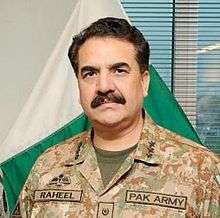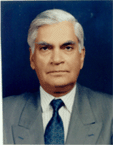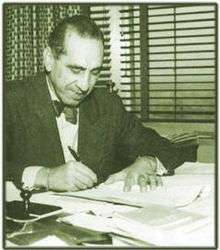Government College University (Lahore)
| گورنمنٹ کالج یونیورسٹی لاہور | |
 | |
Former names | Government College (GC) |
|---|---|
| Motto |
Educating People for tomorrow (historical) Courage to Know (present) |
| Type | Public |
| Established | 1864 |
| Chancellor | Governor of Punjab |
| Vice Chancellor | Prof. Dr. Hassan Ameer Shah |
Academic staff | 436[1] |
| Students | 11,500[1] |
| Location | Lahore, Punjab, Pakistan |
| Campus | Urban |
| Colours | Blue, Goldrod, Maroon |
| Sports | Rameez Raja, Inzmam-ul-haq (Cricket) |
| Nickname |
GCU Lahore GCU |
| Mascot | Ravians |
| Affiliations |
• Higher Education Commission of Pakistan (HEC), • Pakistan Engineering Council (PEC) |
| Website |
www |
The Government College University (GCU) (Urdu: گورنمنٹ کالج یونیورسٹی لاہور ), is a public research university located in the downtown, Lahore, Punjab, Pakistan.[2] It's alumni's include two Noble Prize laureate's (Abdus Salam and Har Gobind Khorana), philosopher Muhammad Iqbal, World Court President Muhammad Zafarullah Khan, four prime minister's of Pakistan and several Rhodes Scholar's.[3]
It is one of the oldest universities in Pakistan as well as one of the oldest institutions of higher learning in the Muslim world.[4][4] It was founded in 1864 as an affiliate college of Calcutta University under the leadership of Gottlieb Wilhelm Leitner,[5] a professor at King's College London. In 1882 it was affiliated with the University of the Punjab. It was granted university status by the Government of Pakistan in 2002; the word college is retained in its title for preserving its historical roots.
GCU today has grown into one of the largest universities in Lahore with 10,808 students and 376 faculty members with 103 PhDs amongst them offering undergraduate, post-graduate, and doctoral studies with a strong emphasis on science and arts.[6] Its departments of physics and mathematics holds an international prestige and retains distinguish image for world-class research and development in the country as well as in the world.[7][8] As of current, the GCU has four faculties within which there are 29 academic departments; there are four research institutes associated with the GCU.[9]
The GCU secured its second position in the "medium category" by the Higher Education Commission of Pakistan (HEC) in 2013.[10] In addition, the GCU has the highest graduation rate in the country, with an average of 95.5% annually.[11] Alumni of the GCU are called Ravians which is derived word from the name of the student magazine "Ravi", published by the administration of the college; the magazine name is inspired by the Ravi River.[12] The GCU is noted for its historical roots and attracted notable scholars such as Leitner, Abdus Salam and philosopher Muhammad Iqbal to studied and became alumnus of the GCU.[13]
History

Under the British Raj Government College was opened on 1 January 1864 in a portion of the Palace of Raja Dhyan Singh Haveli. The institution was affiliated with the University of Calcutta for examination. Along with the establishment of the college, Gottlieb Wilhelm Leitner (professor of Arabic and Islamic Law at King's College in London) was nominated as principal of college. Later, he was instrumental in the foundation of University of the Punjab, established in 1882. The first class consisted of nine students, all of whom matriculated from University of Calcutta. In April 1871, the college moved to its present site. Eric C. Dickinson became its Principal. He taught English at the Aligarh Muslim University.
In 1996, it received autonomous status; on 9 September 2002, it became a university.
Emblem
The Torch, as the Crest of the university emblem, represents the light of knowledge. The motto "Courage to Know" represents the guiding principle of the student community. It is intended to develop courage among the students to fulfil their academic potential.
Academic departments
The university consists of the following faculties, centres and teaching departments:
- Centers Chairs
- Center for Advanced Studies in Physics (CASP)
- High Tension Laboratory (now CASP) – established in 1954 by Dr. Rafi Muhammad Chaudhry to carry out research in Atomic and Nuclear Physics.
- Faculty of Engineering: B.Sc. in Electrical Engineering a four-year degree programme and also offers MS Electrical Engineering a two-year degree programme.
- National Center of Mathematics – The Higher Education Commission of Pakistan has established the National Centre for Mathematics (NCM) at the GC University, Lahore for the advancement of Mathematical Sciences in Pakistan and to develop indigenous human resources and research capability in the field of Mathematics.
- Human Resource Development Center (H.R.D.C) – The center has arranged in service teachers training programmes for the GCU faculty on academic and administrative topics.
Abdus Salam Chair in Physics

The Abdus Salam Chair in Physics, named after the Pakistani theoretical physicist and Nobel laureate Abdus Salam, is a physics research institute of GCU. The institute became operational in March 2000 with the efforts of Ishfaq Ahmad, a lifelong friend of Salam. In 2009 the International Centre for Theoretical Physics (ICTP) donated Salam's original Nobel certificate to the Salam Chair in Physics. The former director of ICTP Dr. Katepalli R. Sreenivasan visited Pakistan where he had gifted the original Nobel certificate to GCU alma mater. The certificate reads: "for their contributions to the theory of the unified weak and electromagnetic interaction between elementary particles, including, inter-alia, the prediction of the weak neutral current".[14]
The institute has academic programmes that promote research activity in physics. Some of its achievements include: getting 52 research publications in international journals; producing 6 PhD and 25 M.Phil theses; the setting up of a Plasma Technology Lab; and contracting research grants from funding agencies and research centres such as the International Centre for Theoretical Physics (ICTP), Pakistan Atomic Energy Commission (PAEC), Kahuta Research Laboratories (KRL),[15] Pakistan Science Foundation (PSF)[16] and Pakistan Council of Scientific and Industrial Research (PCSIR).
Abdus Salam School for Mathematical Sciences (ASSMS)
The Abdus Salam School of Mathematical Sciences (ASSMS) is one of the largest mathematical research institutes in Pakistan.[17] The school was established in 2003 by the Government of Punjab under the aegis of Government College University.[18]
The aim of the School is to train professional scientists to pursue the study of scientific and technological problems by mathematical methods, and to undertake research in branches of mathematical sciences. Before the existence of ASSMS, Pakistani mathematicians opted to study abroad for postdoctoral fellowships, however an increasing number of PhD holders from foreign institutions are choosing ASSMS to pursue their postdoctoral fellowships.[17]
At 2011, ASSMS was labeled as the first "Emerging Regional Centre of Excellence" by the European Mathematical Society.[19]
ASSMS has taken steps to provide encouragement to Pakistani students in schools and colleges. These include:
- The faculty at the Abdus Salam School of Mathematical Sciences host training camps for students from schools and colleges. The participants of the camps are prepared for the national team of Pakistan to compete at the International Mathematical Olympiad (IMO). In 2005, the national team of Pakistan took part for the first time in IMO. In 2007 Pakistan won the first medal at IMO and the first silver medal in 2012.
- ASSMS has organised mathematics contests at the national level.
Institute of Industrial Bio-Technology
The Institute of Industrial Biotechnology GC University, Lahore, was established in April 2005. Prof Ikram-ul-Haq is the first head of the institute. The Vice Chancellor has consented to launch B.Sc., M.Sc, and M. Phil classes in Biotechnology and constitute a separate Board of Studies for the institute.
Postgraduate departments

- Faculty of Arts
- Faculty of Science
faculty of design
- Geography
- Economics
- Botany
- Banking & Finance
- Entrepreneurship and SME Management
- Industrial Chemistry
- Financial Economics and Management
- English
- Computer Science / Information Technology
- History
- Industrial Bio-Technology
- Management Studies
- Mathematics
- Persian
- Physics
- Philosophy and Inter Disciplinary Studies
- Psychology & Clinical psychology
- Political Science
- Statistics
- Telecommunication
- Urdu
- Zoology
Accommodation
GCU has four hostels - three for boys and one for girls. lqbal Hostel (built in 1891) and Quaid-e-Azam Hostel (built in 1993) accommodate about 150 and 200 Intermediate students respectively. New Hostel (built in 1937) houses about 400 Degree students. Girls Hostel (built in 1975) accommodates about 50 girl students
Notable alumni
-

Muhammad Zafarullah Khan served as the president of both the UNGA and the ICJ
-

General Raheel Sharif has been the Chief of Army Staff of the Pakistan Army, since 2013.
-

Abdus Salam won the 1979 Noble Prize in Physics
-

Har Gobind Khorana won the 1968 Nobel Prize for Physiology or Medicine
-

Sir Muhammad Iqbal is considered one of the most important figures in Urdu literature.
-

Faiz Ahmad Faiz was one of Pakistan's leading Marxist's who won the Lenin Peace Prize.
-
.jpg)
Nawaz Sharif has been the longest serving Prime Minister of Pakistan.
-

Ishfaq Ahmad is a versatile theoretical physicist who served at CERN and the International Atomic Energy Agency.
-

Munir Ahmad Khan was a Pakistani nuclear engineer who is known as the "father of the Pakistan's atomic bomb project".
Others associated with the college
- Sufi Ghulam Mustafa Tabassum – noted 20th-century poet of Urdu, Punjabi and Persian
- Prof Dr Saadat Saeed – Famous Poet and Writer
References
- 1 2 "About GCU". Government College University, Lahore. Retrieved 18 August 2012.
- ↑ Google Maps. "Google maps of GCU". Google Maps. Google Maps. Retrieved 9 September 2013.
- ↑ Hallowed halls: Raised by the Ravi
- 1 2 GCU Press. "Abour GCU". Government College University. Government College University. Retrieved 9 September 2013.
- ↑ VC recalls famous alumni as GCU turns 150
- ↑ "GCU Departments". GCU Departments. Retrieved 9 September 2013.
- ↑ "Physics in GCU". Physics in GCU. Retrieved 9 September 2013.
- ↑ "Mathematics in GCU". Mathematics in GCU. Retrieved 9 September 2013.
- ↑ "GCU academic departments". Government College University, Lahore. Retrieved 18 August 2012.
- ↑ "HEC rankings". Higher Education Commission, Pakistan. Retrieved 20 November 2012.
- ↑ "Graduation at GCU". Graduation at GCU. Retrieved 9 September 2013.
- ↑ GCU. "Old Ravian Union". Old Ravian Union. Retrieved 9 September 2013.
- ↑ "About GCU".
- ↑ GCU houses Dr Abdus Salam’s Nobel prize
- ↑ "Research Fellowships Awarded". Government College University, Lahore. Retrieved 2 October 2012.
- ↑ "Research Grants Awarded". Government College University, Lahore. Retrieved 2 October 2012.
- 1 2 "A Report on ASSMS" (PDF). Abdus Salam School of Mathematical Sciences, Lahore. Retrieved 17 August 2015.
- ↑ "About the Abdus Salam School of Mathematical Sciences". Government College University, Lahore. Retrieved 18 August 2012.
- ↑ "Emerging Regional Centre of Excellence". European Mathematical Society. Retrieved 18 August 2015.
External links
| Wikimedia Commons has media related to Government College University, Lahore. |
- Official website
- Old notable alumni GC University Lahore
- GCU Lahore Admission
- Video – President of the seventeenth session of General Assembly
